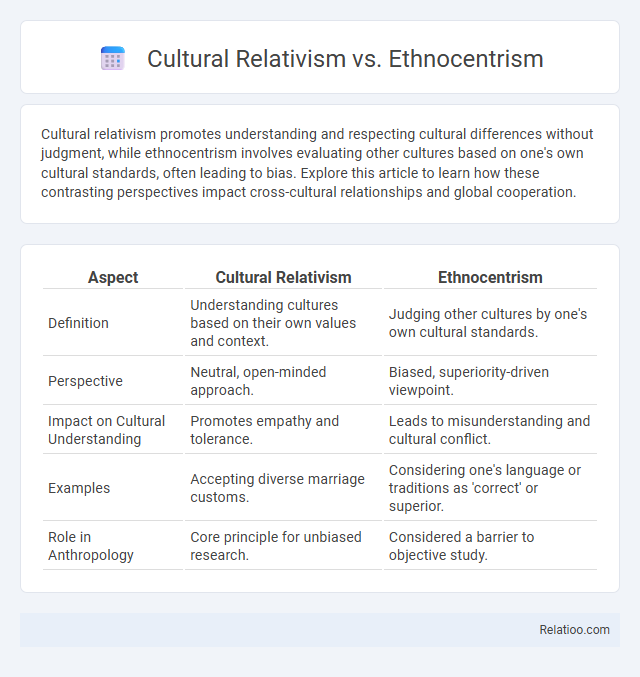Cultural relativism promotes understanding and respecting cultural differences without judgment, while ethnocentrism involves evaluating other cultures based on one's own cultural standards, often leading to bias. Explore this article to learn how these contrasting perspectives impact cross-cultural relationships and global cooperation.
Table of Comparison
| Aspect | Cultural Relativism | Ethnocentrism |
|---|---|---|
| Definition | Understanding cultures based on their own values and context. | Judging other cultures by one's own cultural standards. |
| Perspective | Neutral, open-minded approach. | Biased, superiority-driven viewpoint. |
| Impact on Cultural Understanding | Promotes empathy and tolerance. | Leads to misunderstanding and cultural conflict. |
| Examples | Accepting diverse marriage customs. | Considering one's language or traditions as 'correct' or superior. |
| Role in Anthropology | Core principle for unbiased research. | Considered a barrier to objective study. |
Understanding Cultural Relativism: Definition and Origins
Cultural relativism is the principle that an individual's beliefs and activities should be understood by others in terms of that individual's own culture, emphasizing tolerance and open-mindedness. Originating from early anthropological studies by Franz Boas in the early 20th century, it challenges ethnocentrism, which is the tendency to judge other cultures by the standards of your own culture. Understanding cultural relativism allows you to appreciate cultural diversity without bias, promoting deeper intercultural awareness and reducing misunderstandings.
Ethnocentrism Explained: Meaning and Historical Context
Ethnocentrism is the belief in the inherent superiority of one's own cultural group, often leading to judging other cultures by the standards of one's own. Historically, ethnocentrism shaped colonial attitudes and justified imperialism by promoting the idea that Western culture was superior to others. This concept contrasts sharply with cultural relativism, which advocates understanding and evaluating cultures based on their own values and contexts rather than comparing them to external standards.
Key Differences Between Cultural Relativism and Ethnocentrism
Cultural relativism emphasizes understanding and evaluating beliefs and practices within their own cultural context, promoting open-mindedness and reducing bias, whereas ethnocentrism judges other cultures based on the standards and values of one's own culture, often leading to prejudice and cultural superiority. Key differences include cultural relativism encouraging tolerance and comprehensive cultural insight, while ethnocentrism results in cultural misinterpretation and conflict. These opposing viewpoints impact cross-cultural communication, social integration, and global cooperation significantly.
The Impact of Ethnocentrism on Cross-Cultural Interactions
Ethnocentrism significantly hampers cross-cultural interactions by fostering biased judgments and misunderstandings based on the belief in the inherent superiority of one's own culture. This perspective creates barriers to effective communication and collaboration, often resulting in cultural conflicts or the marginalization of other cultural groups. Embracing cultural relativism allows you to approach cultural differences with openness and respect, promoting more harmonious and productive intercultural relationships.
Benefits of Adopting a Culturally Relativistic Perspective
Adopting a culturally relativistic perspective enhances your ability to understand and respect diverse cultural practices without prejudice, promoting empathy and reducing ethnocentric bias. This approach fosters more effective communication, collaboration, and conflict resolution across multicultural settings. Emphasizing cultural relativism supports social cohesion and global cooperation by valuing differences rather than imposing one's own cultural norms.
Real-World Examples of Cultural Relativism and Ethnocentrism
Cultural relativism promotes understanding and evaluating cultural practices within their own context, as seen in the acceptance of diverse marriage customs worldwide, such as arranged marriages in South Asia. Ethnocentrism often results in judgment and bias, exemplified by Western critiques of indigenous rituals without recognizing their cultural significance. Real-world examples highlight the importance of cultural relativism to foster tolerance and reduce conflicts arising from ethnocentric perspectives.
The Role of Cultural Relativism in Globalization
Cultural relativism plays a crucial role in globalization by promoting understanding and acceptance of diverse cultural practices without imposing one's own cultural standards, which contrasts sharply with ethnocentrism that judges other cultures based on the values of one's own. This perspective facilitates international cooperation, reduces cultural conflicts, and supports ethical intercultural exchanges in global business and diplomacy. Embracing cultural relativism enhances global integration by fostering respect for cultural diversity and encouraging adaptable, inclusive policies.
Challenges and Criticisms of Cultural Relativism
Cultural relativism faces challenges such as justifying harmful practices and potentially enabling moral subjectivity, making it difficult to establish universal human rights. Ethnocentrism, by contrast, imposes one's own cultural norms as superior, often leading to prejudice and misunderstanding toward other cultures. You must navigate these complexities carefully to balance respect for cultural diversity with critical evaluation of practices that may conflict with ethical principles.
Addressing Ethnocentrism in Education and Society
Addressing ethnocentrism in education and society involves promoting cultural relativism to foster understanding and respect for diverse cultural perspectives. Your curriculum should incorporate multiple cultural narratives and encourage critical thinking to challenge biases rooted in ethnocentrism. Implementing inclusive policies and intercultural dialogue can reduce prejudice and support social cohesion by validating different worldviews without hierarchical judgment.
Promoting Intercultural Understanding: Pathways Forward
Promoting intercultural understanding requires navigating the challenges posed by ethnocentrism, which can create biases by judging other cultures through the lens of one's own, while cultural relativism encourages appreciating cultural differences without imposing external values. By embracing cultural relativism, your ability to foster empathy and open dialogue across diverse communities enhances, breaking down barriers caused by misunderstandings. Encouraging education and cross-cultural experiences serves as a vital pathway forward to deepen respect and cooperation among global societies.

Infographic: Cultural relativism vs Ethnocentrism
 relatioo.com
relatioo.com